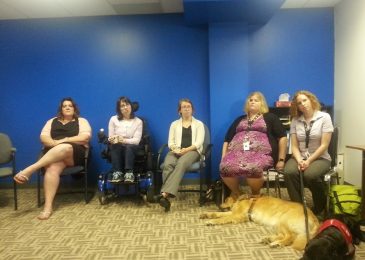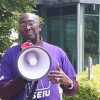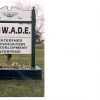KJIPUKTUK (Halifax) – The abrupt cancellation of a program that helps youth with disabilities make an effective transition from high school into the community is leaving students despondent and parents demanding accountability.

The Access to Community Education and Employment program (ACEE), was offered by Independent Living Nova Scotia (ILNS), a not for profit organization. Last month ILNS was informed that the Halifax Regional School Board (HRSB) was withdrawing its funding.
School Board spokesman Doug Hadley told Local Xpress journalist JoAnn Alberstat that it expressed concern to ILNS about the quality and delivery of the program. The School Board has not provided further detail on the nature of these concerns.
ILNS has countered that’s not the real reason at all. ILNS believes that complaints about bullying behaviour by a School Board employee assigned to the program triggered the funding cut. Rather than resolve the issues, the School Board chose to walk away, ILNS charges.
We are a strong group and we will stand together until it’s over. I’m a strong individual whose family has been supporting people with disabilities for years, and I’ve helped students with special needs. We have spent the last ten months learning job skills, volunteering, and looking into future employment or education. Please make the right decision and make a positive contribution to the disability community. Please provide funding to continue our transition. Brandon Boyd, former student.
Some of this year’s 19 students have now gone on record defending the program. They will be unable to complete the program. Students who had expressed an interest in next year’s class will also miss the boat.
“ACEE is one of those places like a bedroom; you feel safe and comfortable. When you feel safe to learn, you learn a lot more. Some people think I’m rude or too straight but I think I know how to see through the cracks.The cracks are where the real world is; our parents have helped us for about 20 years. NOW is the time to shine,” Tywron S. Smith, former student.
The School Board has moved its funding to the Achieve program offered by the Nova Scotia Community College.
Although similar in terms of curriculum, there are fundamental differences between the two programs, says Gina Boyd. Her son Brandon is one of the students unable to complete the ILNS program.
“ILNS has personnel that lives with disabilities, so they provide mentorship for both students and parents, showing what can be accomplished,” says Boyd. “It’s important to have that fundamental understanding of what the steps to independence are. ILNS has that experience, the Community College hasn’t.”
I went from place to place my whole life, never really in one spot long. I never made friends. I ended up moving from shelter to shelter after school because my parents could not deal with me anymore. I had no one until I went into a group home for a year. I still didn’t have my family to help me at this point. Then I came to ACEE. At first I was like “I can’t do this!” but I shortly found out that with the support of ACEE staff, I could. Brittany Singer, former student.
What bothers Boyd more than anything else is the lack of accountability of the School Board, and of the departments of Education and Early Childhood and Community Services, who ultimately are paying the bills.
“Request to speak at the last Halifax Regional School Board meeting were denied, We all went, the kids and the parents, and they voted to not give these kids a chance to speak. In many cases not a single person of the School Board or the departments has spoken to these kids,” says Boyd.
There is a huge demand for programs such as the one that ILNS offered, according to Boyd. 84 students showed interest in taking next year’s course. The Community College Achieve program can only accommodate 15, she says.
“Where are these 84 students going to,” Boyd wonders. “Going home and sit on the couch? Stay in the high school system until they have a proper transition program? Surely that is not a reasonable use of school board resources.”
For Boyd all this suggests discrimination, and parents are pursuing legal advice.
“Every one of these kids worked for 13 year on their IPP (Individualized Program Plan). Research shows that the best chance at success is when you have a solid bridge between high school and community, but all we hear these last three weeks is people saying ‘not our department, not our department’,” says Boyd.
“We believe that this is discrimination. All these people have a right to education on an equal footing. They have a right to try to progress and create stability in their lives and become independent human beings,” says Boyd.




Pingback: Op-ed: Too many left behind. Why funding to Independent Living NS must be restored – Nova Scotia Advocate